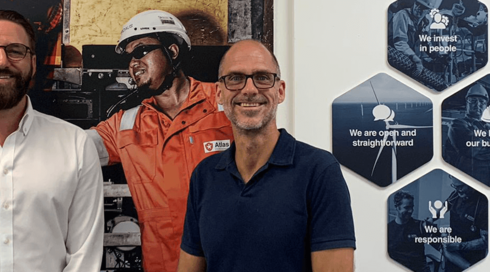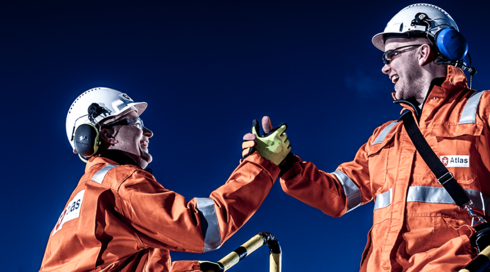5
Nelson Coon (47), Trencher Supervisor
A number of people who work offshore made the step there from the military. This must have something to do with the presumption that both worlds are unconventional and offer a slightly tougher way of life.
Not for the faint-hearted
Nelson Coon (47), Trencher Supervisor, who started his career in the army, confirms that the elements he experienced there are useful for his current job. “The mentality of military trained individuals, whether in the army or navy, is quite similar to offshore workers; there is a high level of discipline that doesn’t just come from training. Plus, you also have to have respect and tolerance for others.” While in the army, Coon was a tank driver which often meant being confined in a small space with many others, thus you can imagine how vital it is to be able to get along with people in this type of environment. The same goes for his current job: “Being on a ship out at sea for weeks on end, if you can’t get along with your crew mates, you might as well jump off board.”
Crossing borders
However, with discipline alone you will not make it within the offshore industry. What’s maybe most essential, is being highly skilled – or at least being very motivated to get there. At the same time, Coon stresses: “It’s important to not take your job too seriously and have the right attitude towards your work and others. You know the job to be done, therefore there’s no point in getting yourself worked up about it, as you’ve got the right group of skilled people working together.” Travel is another key aspect to working offshore. For the most part, Coon has enjoyed working and interacting with different cultures over the past fifteen years. He hasn’t just visited different destinations, he has also worked with different nationalities. Coon has observed how cultures interact with each other during work. An observation Coon has been able to make after working in this field for over fifteen years, is how each culture deals with working amongst multiple nationalities: “While the French tend to stick to their own language (even in emergency situations), the Germans make much more of an effort to create a welcoming working environment. And as for the Japanese, they have a special way of working: everybody wants to be seen as to be doing something, even when they’re just standing around.” Despite the peculiarities, Coon positively recalls all the travel and the cultural experiences this job has given him – even the Friday morning Tai Chi.
Camaraderie
Coon has a very supportive family, which he believes makes it possible for him to do what he does. “I would recommend this job to families who can hack it; families that can’t handle the frequent long periods of seperation, aren’t cut out for this job. Knowing what the advantages of doing this job are for your family tends to help quite a bit.” Coon prefers to work offshore rather than onshore: “Whenever I tried it, I lasted from a few months up to a year and then thought – No! Time to go offshore again.” Coon finds that with working onshore there is a lot more office politics, which is unlike offshore where there is more camaraderie. “Offshore you depend on a team; when something goes drastically wrong you’ve got the guys you’re with to rely on.”
.png)
.png)


